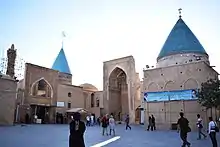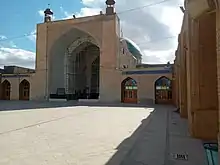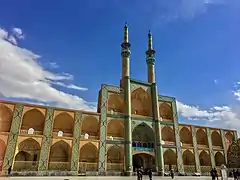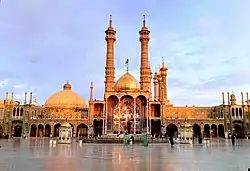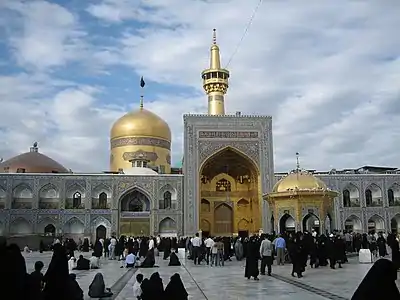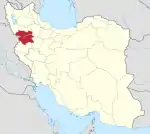Domenareh Mosque
The Domenareh Mosque (Sorani Kurdish: مزگەوتی دوومنارە, Persian: مسجد دومناره) is located in Saqqez, Iran. It is one of the oldest mosques in Saqqez as well as the whole of Kurdistan Province surviving in its full original form. It belongs to the Afshari time and the early Zandian period. This work was registered as one of the national works of Iran on March 16, 1999 with the registration number 2600.[1][2][3]
| Domenareh Mosque | |
|---|---|
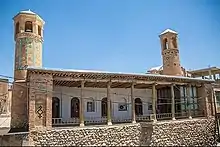 | |
| Religion | |
| Affiliation | Islam |
| Year consecrated | 1700 |
| Location | |
| Location | Saqqez, Iran |
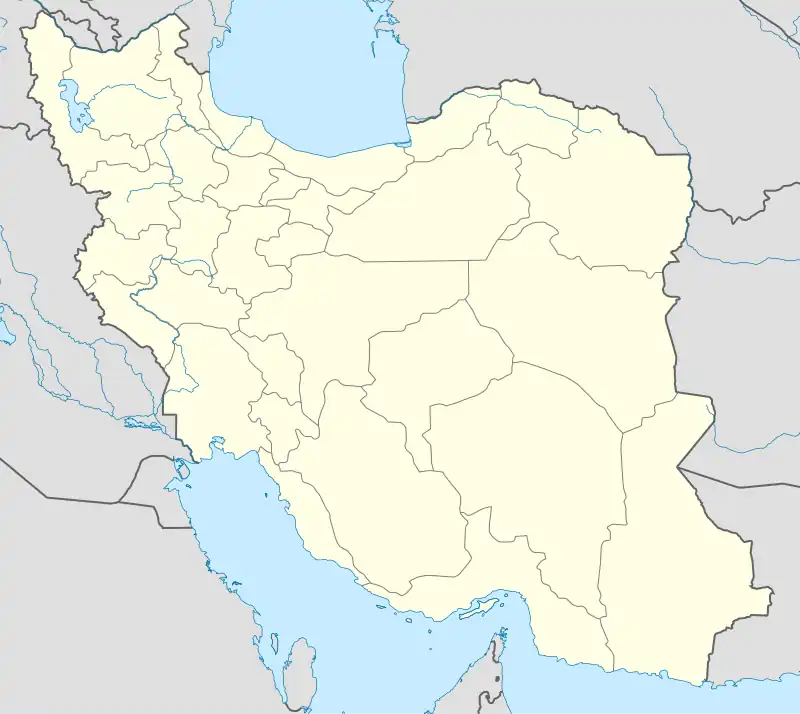 Shown within Iran | |
| Geographic coordinates | 36°23′55″N 46°26′55″E |
| Architecture | |
| Type | Mosque |
| Style | Islamic Architecture |
| Founder | Sheikh Hassen Molanabad |
| Completed | 1700 |
| Specifications | |
| Dome(s) | 2 |
| Minaret(s) | 2 |
| Materials | raw clay, bricks, and wood |
Construction
This mosque has an almost square plan. In its construction, materials such as raw clay, mud mortar, carcasses, bricks and wood have been used. The entrance of this mosque is located on the west side. At the entrance, it has a brick door with a Chinese knot texture of yellow bricks and tiles; Which represents the Zandieh period. After the entrance, there is a corridor of about 3 by 3.5 meters, from which the roof of the mosque can be reached by nine steps.[4]
History
According to local traditions, the mosque dates back to the time of Sheikh Hassan Molanabad, a famous mystic and mathematician of the Afshari era. When Nader Shah Afshar left for Baghdad, he passed through Saqqez and at the request of Sheikh Hassan Molanabad to build a mosque for the people of that city, Nader Shah ordered the construction of this mosque in the old part of Saqqez. Even now, some locals call this mosque Sheikh Hassan Molanabad Mosque. One of the signs and reasons for the validity of this claim is that in this journey, Nader Shah also gives two inlays and a beautiful painted leather tablecloth as a gift to Sheikh Hassan. These gifts are currently kept in the village of Molanabad, where Sheikh Hassan's tomb is located. There is also a Manuscript Quran in the tomb of Sheikh Hassan, which dates back to the late Afshari period.[5][6][7]
Gallery
 Wall view
Wall view Mosque porch from outside
Mosque porch from outside The door of the mosque
The door of the mosque View of the minaret
View of the minaret Mosque view
Mosque view The roof of the mosque from inside
The roof of the mosque from inside The porch of the mosque
The porch of the mosque View of the minaret
View of the minaret Inside the mosque
Inside the mosque
References
- Domenareh Mosque In Saqqez
- Saqez two minarets mosque, a relic from the Afshari period
- Introducing the mosques of Kurdistan
- Saqez Domenareh Mosque, a distinctive building among the mosques of Kurdistan
- Everything about Saqez Domenareh Mosque
- Saqez Domenareh Mosque; Memorial of Sheikh Hassan Molanaabad
- Saqqez historical mosque with two minarets
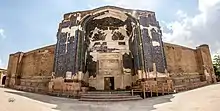
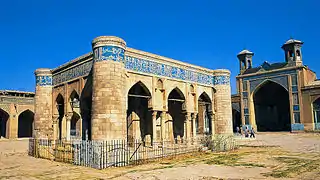

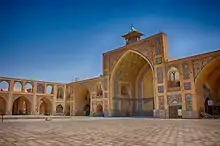

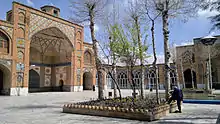
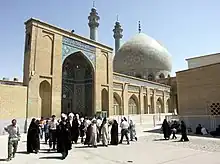
%252C_2014.JPG.webp)
